facebook 2 icon instagram icon youtube icon microphone icon


Surprising Sophomore Lessons on the Power of College Campus Visits
by Tom Kleese | May 3, 2019 | College Planning Blog

Visit college campuses often. And visit early. If we’ve said it once, we’ve said it 1000 times. Freshmen and sophomores? Do you think it’s too early to visit college campuses? Surprise! It’s not! But don’t take our word for it.
Minnesota sophomore Claire Ficek can tell you all about the benefit of visiting college campuses early. Even before Claire decided to spend her sophomore spring break touring college campuses with her family, we knew she was smart. Claire lives in a suburb of the Twin Cities where she loves riding horses, attending and watching sports events and serving others through mission trips and local service efforts.
Student stories are so important! Claire said it best, “When you hear it from another student, you can really trust what they’re saying.” Thanks for taking the time to talk with us, Claire. Here’s our Q&A with Claire about her college campus visit experience over sophomore spring break this year.
How did college campus visits change your definition of your ideal college experience?
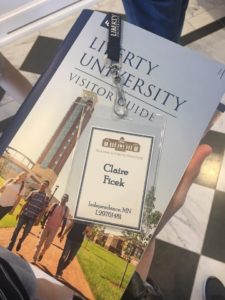
Stuff gets real when you see your name on the Visitor Tag!
Claire: Before I visited, I thought maybe I wanted a huge, public university. I thought I wanted a really big school with challenging classes, down in the South. I thought I needed a lot of sports and a lot of things happening around campus.
Now my definition of an ideal college experience is more focused, and it’s different than what I thought.
I visited all these big universities, and I don’t think I could call those places home. I learned how important it is to me to choose a Christian school, because that’s really important to me. So now my ideal college experience is that I want a small-medium-sized, private Christian college with hard classes, down in the South. Having a lot of sports still matters, but it’s on my want (not need) list. I love high school activities and sports, but I don’t know if I could do something like a Tennessee. Definitely I saw an example of what I want at Liberty. They’re building a brand new business school, and I think I want to major in something business or marketing-related. And because I’m considering a minor in Spanish and want to study abroad, that’s a big consideration, too.
How did you decide which schools to include in your college campus visits?
Claire: For some, it was word of mouth or watching college sports and getting curious about those schools. A couple were recommended to us once friends heard we were visiting over spring break. Some we added because they were close to schools we’d already chosen. And I have a couple of friends going to a couple of the colleges we visited.
Were you anxious about visiting colleges?

One of the best parts was talking to students. That was great. Adults all pretty much say the same thing, “We’re an awesome school.” But I really believed what the students told me when I talked to them.
What types of questions did you ask the students?
Claire: I asked what they were majoring in. Things they liked about the college. Where they were from. How they chose the college. Where else they applied. I learned that these are just college kids that are figuring it out along the way. And just a few years ago, they were right where I am now. That was a relief. They were really nice, and seemed eager to answer my questions. It’s not until you get to talk to the students that you really have a good idea of what it’s like to go to school there. What you learn from the students helps you differentiate one school from another.

Another day, another campus. Duke was beautiful!
When we were visiting Kentucky, we were at a restaurant close to campus. We asked a college sophomore sitting next to us where she was from and what it was like here. Turns out she was from Wisconsin. She admitted that on a big campus, she had trouble finding her way at first, but it wasn’t as bad as she thought it was going to be. It was good to get her input.
At Liberty, students talked about how much they’ve grown in their faith. That’s what I needed to hear, because that’s really important to me. The Liberty students said that their professors are there for them. Liberty is now my first choice, after visiting all the colleges we did.
What about the schools you didn’t like? Were those visits still valuable?
Claire: Yes! Even though I didn’t love every school we saw, it was good to visit both schools I liked and schools I didn’t like. I got to see a mix of large university and small, faith-based colleges.
What type of planning did you do before you started your college campus tours?
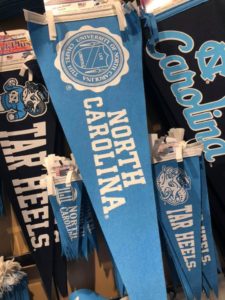
What advantage is there to seeing a lot of colleges in a short amount of time?

I used a notebook and made pro/con list of every college while touring. My parents and I would debrief during the drive to the next place. I was able to pick up on things my parents noticed that I didn’t notice. Comparing notes was really important.
So now that you’ve done some college campus visits, are your next college planning steps clear?
Claire: Definitely. I’m going to contact my friends who’ve already gone to college and interview them. I’m also doing a lot of online research for private Christian colleges in the South.
What’s your advice to freshmen and sophomores about college campus visits?

My brother Charlie and me. He and my sister Kate are great sports!
Claire: Start small. Just jump online and look at some colleges you might want to visit. Brainstorming is actually really fun. You could even just go visit a random college that’s close by. (That’s what we did back in December.) See what you like, what you don’t like. I have heard friends who are seniors this year say they didn’t know where they’re going yet two months before graduation. I don’t want to be in that position. I’m a planner, so not knowing in the middle of my senior year would add way too much stress for me.
Also, if you start early, you’re a freshman or sophomore and you can still change the classes you’re taking based on what you learn on your visits. For instance, I learned some things about college foreign language requirements that I didn’t know before we visited.
And remember that the schools definitely want you there. They want you to come visit. The college wants anyone and everyone there to visit because they want you, they want new people in the door. Don’t be nervous. Take your time. If you start early, then you have time. If you start late, then you’re in a time crunch. If you do the behind the scenes work first, then you’ve got three years to do it all on your timeline.
Great advice, Claire. Thanks for sharing your college campus visit experience!
Freshman and sophomores, you can download our free Campus Visit Bullet Journal here . Or schedule a free consult any time to talk about your next steps for college planning.
Recent Posts
- Pacific Northwest Expedition (or How I Traded My Credit Card Miles for Campus Visits)
- Estimating College Costs with Net Price Calculators
- Merit Aid: Your Teen’s Best Part-Time Job
- College Costs Simplified: The 15/35/45 Rule
- Why the ACT still matters: Facts and FAQ’s
Recent Comments
5930 Seminole Centre Court Suite D Fitchburg, WI 53711
(608) 553-3445
Our Policies
- Privacy Policy
- Terms and Conditions of Use
- Student Athletes Login
- College Coaches Login
- Club & HS Coaches Login
Everything You Need to Know About Official Visits

Going on official visits is one of the most exciting parts of the recruiting process. Not only do you have the opportunity to see a college campus in person but being invited also signifies that the coach is very interested in you as a recruit. This is your opportunity to get to know the campus, the culture, the team and the dorms and then decide if you would feel comfortable living there for the next four years.
Quick Links
What is an official visit.
So, what makes a visit official? Any visit to a college campus in which any part is financed by the school is considered an official visit. Coaches usually save invitations for their top recruits and getting asked is a huge step on your recruiting journey. It’s important to prepare in advance for this crucial part of the recruiting process. We’ve put together everything you need to know to ace your next official visit.
NCAA official visit rules
Each division level has its own set of rules surrounding official college visits. Division I has the strictest regulations. The following are the rules you need to know:
- The NCAA allows recruits an unlimited number of official visits to Division I schools. Recruits are limited to one per school, unless there is a head coaching change after their visit, in which they are permitted a second visit. Visits to Division II and Division III schools are unlimited.
- The school can pay for the following for you and your parents/guardians: transportation to and from the campus, lodging throughout your visit, three meals per day and three tickets to a home sports event.
- Schools may pay for a recruit’s transportation to and from campus. However, they can only provide transportation for parent/guardians if they travel in the same car as the recruit. Flights and separate bus or train tickets may not be purchased for parents.
- At all levels, recruits can take only one official visit per school.
- Each official visit may be up to 48 hours long, or the span of one weekend.
- D1 men’s ice hockey recruits can begin taking official visits as early as August 1 of their junior year in high school.
- D1 football recruits can begin taking official visits starting April 1 of their junior year of high school.
- D1 women’s basketball recruits may begin taking official visits in April of their junior year of high school, beginning the Thursday following the Women’s Final Four tournament.
- D1 lacrosse, softball and baseball recruits may begin taking official visits September 1 of their junior year of high school.
- For all other DI sports, recruits can begin taking official visits starting August 1 before the athlete’s junior year of high school.
- Official visits are not allowed to occur during recruiting dead periods.
Within these official rules, each school will have a slightly different way in which they conduct visits. Some schools will be able to finance your whole trip, paying for transportation, meals, lodging and tickets to a home game. But this is the maximum of what colleges can provide for their recruits. Some programs simply may not have the money to pay for your entire visit, opting to finance just a small portion of your visit. An official visit can also include having an on-campus lunch or dinner that is purchased by the coach. It doesn’t have to last the full 48 hours—again, that’s the maximum amount but not a requirement.
Generally speaking, the more money a coach spends on your official visit, the higher up on their list you are as a recruit. However, that’s not a reason to discount a program that’s trying to recruit on a budget. If you’re interested in a school, official visits can be the last piece of the puzzle to help you understand if it’s your best college fit.
What are the new recruiting rules around official visits?
Effective on April 13, 2023, the NCAA Division I Council announced that they will no longer limit the number of official visits recruits can make to NCAA member schools. Starting July 1, 2023, recruits are permitted an unlimited number of official visits to Division I schools, unless there is a head coaching change post-visit, in which case recruit is allowed to complete a second official visit to the same school. For men’s basketball, prospects still will be able to complete a second official visit to the same school, as long as it do not occur in the same academic year.
Effective May 1, 2019, the NCAA created a series of updated recruiting rules to slow down the recruiting process and cut back on the number of recruits getting verbal offers as eighth graders, freshmen and sophomores in high school. Athletes will now have more time to research colleges and focus on developing athletically and academically. Then, as juniors and seniors in high school, they will be better equipped to decide which college or university is right for them.
According to the new rules, DI recruits in most sports can now start taking official and unofficial visits starting August 1 before their junior year of high school. In the past, official visits weren’t permitted until the athlete’s senior year of high school and there were no restrictions on unofficial visits. While this is exciting news for recruits eager to visit campuses, these rule changes will also likely put more emphasis on athletes and families needing to be proactive early in the recruiting process. With top prospects being offered official visits their junior year, this means even more schools can lock down their recruiting classes early. As a recruit, you need to start the recruiting process as early as possible so you’re ready for official visit invites August 1 before junior year.
How does an official visit work?
Depending on the sport and division level, athletes can begin taking official visits junior year. A coach may extend an official visit offer to recruits during a phone call, email, text or direct message. Once a coach invites you, grab your family schedule and work out a weekend to take the trip.
While receiving an invite does indicate you are at the top of a coach’s recruiting list, it doesn’t mean you’ve locked in your spot just yet. This means the coach will be evaluating you during your entire official visit. Most importantly, visits are a great way for coaches to get a better understanding of your personality and character. They want to see if you are a recruit who will be a positive asset to their team and the school.
To learn more, check out our video on how to schedule your visits , where NCSA recruiting experts share what you can expect. This includes what travel expenses might be covered by the program, activities that coaches use to introduce you to the team and campus, and what coaches expect from recruits during a visit.
Insider Tip : Coaches will look at how you interact with your parents—are you respectful, courteous and kind? Or, do you brush them off and behave rudely? Do you answer the coaches’ questions thoughtfully or do you give one-word responses? While it may be intimidating to visit a college campus and get evaluated by the coaches throughout, it’s important to make an effort to put your best foot forward.
How to prepare for your official visit
Because official visits are more formal than unofficial visits, there’s a bit more prep work required from athletes before the visit takes place. Follow this checklist to make sure you’ve covered all your bases:
- Register with the NCAA Eligibility Center . Before your visit, the coach needs to know that you are eligible to actually compete at their school. If you’re visiting Division I and Division II schools, you need to get a Certification Account . Make sure that your parent/guardian is with you as you sign up, because there is a fee involved. This is a good step to take your sophomore year of high school, so you’re ready to start taking official visits your junior year. If you’re visiting a Division III school, sign up for an NCAA Profile page, which is the free version of the Certification Account. You only need a Certification Account if you’re actively getting recruited by Division I and/or Division II colleges. When you register with the NCAA Eligibility Center , you will receive your NCAA ID number. Many coaches will ask for your NCAA ID number before your official visit.
- Have the coach add you to the Institutional Request List. This is another formality to ensure that you are eligible to compete at an NCAA school. Request that the coach add you to the IRL list, which will put your Eligibility Center application on a fast track to get cleared. Because the NCAA receives so many requests through its Eligibility Center, the Institutional Request List serves to make sure athletes who need to be cleared quickly will be.
- Send the admissions office your transcript and a standardized test score. If you’ve already registered with the Eligibility Center, the school should be able to access your transcript and test scores. However, this step helps the admissions office ensure that your academic criteria are up to the standards of that school, while the NCAA Eligibility Center ensures that you’ve met the academic requirements mandated by the NCAA to compete in college sports.
- Know how you will respond if you receive an offer. As mentioned earlier, offers are not guaranteed during official visits, but they do happen. To avoid freezing on the spot, go into your official visit with a game plan for how you will respond. If this is your top school and you’ve visited the other colleges you’re interested in, it might make sense to say yes as soon as possible. However, if you have other schools on your list, you can ask the coach when the offer will expire.
- Put together your list of questions for the coach. During your official visit, you will have a chance to get all your questions answered, so take advantage of this opportunity. Sit down with your parents before the visit and brainstorm all your questions. Write down your questions for the coach and bring the list with you. This way, you don’t forget an important topic and you can impress the coach with your preparedness.
Read more: How to Maximize Your Summer Visits
Do parents go on official visits?
Parents are invited to go on official visits. The school can pay for three meals per day and tickets to a home sports match. However, the school is only allowed to pay for their transportation to and from campus if the parents are traveling in the same car as the recruit. Flights and separate bus or train tickets may not be purchased for parents. Parents have a very specific role throughout the official visit: Let the athlete be the focus of the experience.
For some parents, it might be hard to let go and allow their student-athlete to take center stage during this visit. However, parents should let their athlete ask questions and take control of the conversation. Give them an opportunity to hold a candid, uninterrupted conversation with the coach. Allow them to make their own opinions about the school before injecting your point of view. When the conversation turns to finances, scholarships and paying for college, this is where coaches typically expect parents to jump in .
For more on the topic, check out the video below featuring former sports broadcaster David Kmiecik and D1 and D3 swim coach Danny Koenig.
Read more: Recruiting Tips for Parents
What happens on an official visit?
While every official visit will be slightly different, recruits can expect that the trip will include a campus tour. This is your chance to familiarize yourself with the campus and ask yourself if you would enjoy living there for four years. As you tour the campus, take notes. When you’re trying to remember what you liked—and didn’t like—about each of the schools you visited, you can refer back to your notes to help jog your memory about the trip. Use the following checklist to make sure you hit all the key spots on campus:
- Check out the library and sit in on a class.
- Visit the different housing options, both on and off campus.
- Meet your future training staff.
- Eat in the school cafeteria or food court.
- Set up a meeting with an academic adviser.
- Hang out on the campus grounds.
- Stay off your phone and experience the campus.
Coaches typically will want you to meet a few members of the team—or the whole team—to see how your chemistry checks out. You may also be invited to participate in a workout or another team activity. According to NCAA rules, however, any kind of workout you attend on an official visit cannot be organized by the coach or coaching staff. Typically, the workout will be led by the team’s captains. Take this opportunity to see if you connect with your potential teammates.
Questions to expect from the coach on your official visit
You will also likely get some one-on-one time with the coach. This is a chance for you to ask any final questions that you have. Before your visit, write down some questions and keep adding to the list so you have something to go off of when you sit down with the coach. The coach will also probably have some questions for you, too. Here are just a few examples of questions to expect from a coach during your visit:
- “What other schools are recruiting you?” Be honest here and tell the coach other schools you’re actively talking to. If it’s true, list schools that are rivals with or comparable to the school you’re visiting. This will make the coach want you on their team even more.
- “What other colleges are you visiting?” Again, it’s important to be honest. If you have—or haven’t—visited any other schools yet, let them know.
- “When can you commit?” While getting invited on an official visit doesn’t necessarily mean you’ll get an offer, it certainly does happen. If this is your number one school and you have a good feeling about it, this might be the right time to lock down a commitment. If you have any other schools to visit before you make your decision, that’s OK, too. Simply make an educated guess when you think you will know. Ask the coach how long the offer stands and when they would like to know your answer.
Some coaches will arrange for you and your parents to attend a home sporting event. They might also have a teammate take you to dinner or walk you around campus again. Plus, you’ll get some free time to explore the area and learn more about the school.
What to bring on an official visit
A lot of recruits ask us what to wear on an official visit, and our best piece of advice is to err on the side of overdressing, rather than underdressing. You want to look neat and clean throughout your entire trip. For men, bring a collared shirt with nice jeans or khakis. For women, a skirt, dress, nice slacks or jeans are acceptable. Avoid wearing sweatshirts, sweatpants, hats, flip flops and ripped jeans. Bring athletic clothes and shoes in case you get invited to work out with the team.
As mentioned before, it’s a great idea to come with some questions for the coach. When the moment comes to ask your questions, it’s easy to freeze up and forget them all. Having them written down will ensure you get the answers you need, plus it will show the coach that you are organized and responsible. Make sure you do your homework and read up on the school, too.
Your follow-up after the visit
Have you ever heard that the follow-up is the most important part? After each visit, make sure you follow up with the coach. Send them a “thank you” note, thanking them for their time and telling them some of your favorite parts of the visit. You can also let the coach know where you’ll be competing next if they’d like to watch you in person. The follow-up shows the coach you’re a thoughtful, courteous athlete, and it also keeps you top-of-mind as they assemble their roster.
Overall, enjoy your visit! This is your chance to get the “red carpet” treatment and get a taste of what life at that college will be like.
- Instagram link
- TikTok link
- Facebook link
- All in Award
- Press and Media
- How to Get Recruited
- Recruiting Guide for Parents
- NCAA Recruiting Rules
- Managing Your Recruiting

IMG Academy+
Mental Performance & Nutrition
Athletic Recruiting

- Athlete Memberships
- Football Camps
- Emailing Coaches
- D1 Colleges
Advertisement
6 College-Planning Tips For High School Sophomores And Their Parents
Copy the code below to embed the wbur audio player on your site.
<iframe width="100%" height="124" scrolling="no" frameborder="no" src="https://player.wbur.org/hereandnow/2017/03/22/college-planning-tips-high-school-sophomores"></iframe>

High school juniors and seniors are well into their college preparation — taking the SAT, visiting schools and filling out applications. But it's not too early for sophomores to start planning.
Here & Now 's Jeremy Hobson gets some tips on what 10th-graders — and their parents — should be thinking about from Lisa Micele ( @LisaMicele ), director of college counseling at the University of Illinois Laboratory High School in Urbana, Illinois.
- Scroll down to read Lisa's tips for students and parents
High school is indeed a four-year journey. Lots of energy is given to freshmen and their transition to high school. Juniors and seniors often have regular programming geared toward the national timelines of college admissions. What is a sophomore to do? This is a group of students that may get overlooked at this time of year.
Here are proactive tips for those in Grade 10 and their families — to build early college planning on a healthy foundation.
6 Tips For Sophomore Students
- If you participated in any practice tests this year (i.e. practice ACT or a practice to the PSAT you will take as a junior), now is the time to correct your mistakes. Review your results with your school counselor and seek assistance from your high school English, science and math teachers to correct mistakes as well. Use free online test preparation tools. Your practice PSAT, for instance, will connect you to Khan Academy (in partnership with the College Board).
- Begin to take more ownership of your education. Take the initiative to talk with teachers. If you are seeking advice on how to best prepare for the next test, or you need help finding summer opportunities, you (as the student) should reach out to your school counselor, teachers and mentors. And, if you need a letter of recommendation to endorse you for any summer opportunity, this request should come from you (and not your parents).
- Start creating your profile on free scholarship search engines. Here are two great sites to get you started: Cappex and Fastweb .
- Keep a journal. Write down your thoughts as you begin to think more deeply about your likes, dislikes, hopes and desires for the future. College planning starts with you knowing yourself first — not grabbing a list of colleges. Here are a few sample questions to get you started . Be open to this journey of self-discovery, and embrace the fact that you will grow and change over time.
- Nothing is more important than a strong high-school curriculum. Review your course schedule plans for next year with your school counselor and parent/guardian. While you do not need to declare a major in order to apply to college, if you are showing natural curiosities in an academic area, see what advanced courses, electives, online learning or community resources can feed this interest.
- Summer is right around the corner. You should seek a balance of organized activities with fun downtime. Share your hopes for summer with your parent(s) or guardian(s), and make sure that you show initiative in planning out a summer that is rewarding to you both intellectually and socially. Do you have a genuine desire to serve others? Check out local volunteer efforts that are happening in your backyard, and don’t forget about simply reaching out to a friend in need. Summer employment may be in your future, too.
6 Tips For Sophomore Parents
- Educate yourself on the landscape of admissions and financial aid. Talk with your student’s high school counselor about healthy ways to support your student through this process. Don’t get sucked into the "prestige game" when it comes to thinking about colleges. Show your student that you are doing early steps, too. For example: It’s never too early to use Expected Family Contribution (EFC) calculator and online tools to understand the costs of college.
- Consider visiting campuses. College visits for sophomores are a great way to expose them to types of schools (urban, rural, large research universities, small liberal arts, etc.) This is a low-stress time to let your student experience an admission talk and tour. Remember that it’s not about building a list of colleges — just remove this from your mind. It is about having them hear about cool residential college systems; unique academic calendars; campus traditions; internships that connect them to a larger world. There is no such thing as a wasted visit. Hearing what your student doesn’t like is just as helpful. Take notes when you see them smile and when something sparks their interest. Debrief a bit in the car to journal first impressions. Here is a great little tool to take on college visits.
- Reframe the conversation. Don’t ask a sophomore: "What do you want to major in?" Instead, ask them what their favorite classes have been and why. Ask them how they would construct an entire day for themselves, if given the freedom. Where do their natural curiosities lie? Inquire with the high school if they have any inventories on interests, values and abilities that will help your student to explore possible majors. You can also contact your local community college career services office for assistance on this front as well. (And remember to relax on this front. "Undeclared" is a popular major for freshmen!)
- Model good behavior. Do you talk about certain colleges and potentially discount others? Your student is listening to you. They will pick up on your "values" based upon your words and actions. Focus on personal fit over name.
- Just stop! To channel Julie Lythcott-Haims, author of " How to Raise an Adult ," parents must start to put independence in their student’s way. The college application process is a student-centered (and student-driven) process. If students are accustomed to having their parents handle and manage everything in their lives, they will not be ready for the many steps in this college search journey that require them to "step up" and take the lead.
- Yes — let them take the lead! This philosophy applies to summer planning as well. While it may be tempting to map out their summer filled with academic camps, sports and volunteering, parents must listen to their student more than they talk. (see student tip No. 6)
To all of the grade 10 students and parents out there, #YouCanDoThis!
This segment aired on March 22, 2017.
- More Advice From College Counselor Lisa Micele
- Does Social Media Help Students Stand Out To Schools?
- Author: Helicopter Parenting Damages Kids u2013 And Society
- The College You Go To May Not Matter As Much As You Think
More from Here & Now

Applying To College
College essay writing and interview skills.

10 College Visit Tips for High School Sophomores
March 16, 2013 by Sharon Epstein 3 Comments

Summer on the Arts Quad – Cornell University
A friend of mine just called. Her son’s a high school sophomore and she was wondering if she should take him on college visits this year. She thought she’d start with schools that are nearby so he could get a feel for what college visits are like.
Is sophomore year too early to visit? Not at all. If you visit early, however, and then decide to apply, you may want to go back for a second visit. You also might find you’ve forgotten some key details, such as the names of the tour guide, admissions officer, and instructors you met (although notes and photos are good reminders).
Early visits can be helpful when a student:
- Can’t get a good sense of schools online
- Isn’t sure what size school would be best
- Needs to get a feeling for rural, suburban, and urban environments
- Is uncomfortable or shy about asking questions
- Will be visiting different parts of the country
- May need extra help or time to organize the college search
Here are 10 Tips for Sophomores to Make the Most of College Visits:
- Put down the phone and look around. This visit is for YOU and you won’t get much out of it if you’re answering texts and checking Instagram. Pay attention – you’re about to choose where you’re going to spend the next four years of your life.
- Relax. No one is watching you. Even better, you’re a year ahead of many students on the tour who are feeling the pressure to decide where they’re going. So take a deep breath and just let it all sink in.
- Keep an open mind . Forget where your friends want to go. (Most of it’s just talk anyway.) Forget about what kind of school you think is “prestigious.” (Lots of schools you never heard of have the best programs in the country.) Keep your options open – you can’t find the best school if you don’t give it a fair shake.
- Go with your gut . A big part of the college search is figuring out what schools will be a good match for you. So look around campus. Eavesdrop on students’ conversations. Grab a cup of coffee and hang out wherever there’s a hangout. Try it on and see if it fits .
- Listen to questions. Pay attention to the questions students and parents ask on the tour. You may want to ask some of those same questions next time.
- If you’re shy, plan to ask one question and then make sure to ask it. Start getting comfortable now .
- Explore. Go “off-road” and find the places that aren’t on the tour. Duck in to the dining hall and the library. Size-up the gym facilities, the radio station, the theater – whatever interests you. Ditch your parents and take a walk by yourself.
- Debrief. On the way home, review your experience with your parents. Discuss what you learned, what was exciting, what you’d change, and what you didn’t like. As you talk, your college search will not only begin to take shape, but your parents will also become better equipped to help you navigate your way.
- Include General notes : Your overall impression, including the size of the school, types of classes that are offered, and if you felt it might be a good fit.
- Include Specific notes : Details, including the names of buildings you want to remember (a dorm you thought you’d like to live in, for example), as well as the people you met and the names of courses, activities, or instructors that were recommended.
- Get organized. Start a file for each college you visit.
- Think of questions to ask next time. Now that you’re starting to get a sense of what appeals to you, make a list of questions for your next trip. After each college visit, remember to debrief and refine your questions. Soon you’ll be way ahead of most of the other students, because you’ll have learned how to figure out which school is right for you .
Recommended blog posts: 5 Questions to Ask Students on Your College Visit Best College Town – Ithaca, New York
Other recommended links US News & World Report: Get a Head Start on College Visits The Choice: Making the Most of a Campus Visit
Related links:

Share this:
Author: Sharon Epstein
College consultant, teaching students how to write memorable college application essays, grad school and prep school essays, and succeed at job and college interviews.
3 thoughts on “ 10 College Visit Tips for High School Sophomores ”
Leave a comment

These are wonderful tips! We went on a college visit when my son was a junior and the admissions reps were impressed that we were starting early. Visiting as a sophomore is even more impressive! I would just add to have the student make it a point to personally introduce themselves to an admissions rep and make sure they get noticed instead of becoming lost in the crowd of older students. Also, some early visits include a free enrollment application. See if a current one can be sent to the student if and when they are ready to apply. Those application fees add up!
Thanks for the additions, Monica. I love the idea of the free enrollment application!
Pingback: 5 More College Visit Tips for High School Sophomores | Applying To College
Leave a comment Cancel reply

- Already have a WordPress.com account? Log in now.
- Subscribe Subscribed
- Copy shortlink
- Report this content
- View post in Reader
- Manage subscriptions
- Collapse this bar
Sophomore Year and College Admissions
10 Areas Every 10th Grade Student Needs to Think About to Prepare for College
- Application Tips
- College Admissions Process
- College Profiles
- College Rankings
- Choosing A College
- Essay Samples & Tips
- Testing Graphs
- College Financial Aid
- Advanced Placement
- Homework Help
- Private School
- College Life
- Graduate School
- Business School
- Distance Learning
- Ph.D., English, University of Pennsylvania
- M.A., English, University of Pennsylvania
- B.S., Materials Science & Engineering and Literature, MIT
Your college applications are still a couple years off when you start 10th grade, but you need to keep your long-term goals in mind. Work on keeping your grades up, taking challenging courses, and gaining depth in your extracurricular activities.
Below are ten areas to think about in 10th grade to help ensure you're a strong college applicant when senior year rolls around.
Continue to Take Challenging Courses
An "A" in AP Biology is more impressive than an "A" in gym or shop. Your success in challenging academic courses provides the college admissions folks with the best evidence of your ability to succeed in college. In fact, many admissions officers will strip out your less meaningful grades when they calculate your high school GPA.
Advanced Placement, International Baccalaureate, and Honors classes are an important part of a strong college application at selective schools. Even if you don't take these classes in sophomore year, make sure you put yourself in a position to do so junior year.
Grades, Grades, Grades
Throughout high school, nothing matters more than your academic record . If you're aiming for a highly selective college, every low grade you earn might be limiting your options (but don't panic—students with the occasional "C" still have plenty of options, and there are some great colleges for "B" students ). Work on self-discipline and time management in an effort to earn the highest grades possible.
Put Effort Into Extracurricular Activities
By the time you apply to colleges, you should be able to demonstrate depth and leadership in an extracurricular area . Colleges will be more impressed with the applicant who played first-chair clarinet in the All-State Band than the applicant who took a year of music, spent a year doing dance, three months of chess club and a weekend volunteering at a soup kitchen. Think about what it is that you'll bring to a college community. A long but shallow list of extracurricular involvement really doesn't amount to anything meaningful.
Continue Studying a Foreign Language
Colleges will be much more impressed by students who can read Madame Bovary in French than those who have a shallow smattering of "bonjour" and "merci." Depth in a single language is a better choice than introductory courses to two or three languages. Most colleges want to see a minimum of two years of language study, and at the most selective schools, you'd be wise to take a language for four years. Be sure to read more about college admissions language requirements .
Take a Trial Run of the PSAT
This is entirely optional, but if your school allows it, consider taking the PSAT in October of 10th grade. The consequences of doing poorly are zero, and the practice can help you figure out what type of preparation you need before PSAT and SAT time in your junior and senior years. The PSAT won't be part of your college application, but be sure to read why the PSAT matters . If you're planning on the ACT instead of the SAT, ask your school about taking the PLAN.
Take SAT II and AP Exams as Appropriate
You're more likely to take these exams in your junior and senior years, but more and more students are taking them earlier, especially as high schools increase their AP offerings. It's worth studying for these exams— many colleges require a couple SAT II scores , and a 4 or 5 on an AP exam can earn you course credit and give you more options in college.
Familiarize Yourself with the Common Application
Look over the common application so that you know exactly what information you're going to need when you apply to colleges. You don't want senior year to roll around and only then discover that you have gaping holes in your high school record. It's not too early to think about what honors, awards, service, extracurricular activities, and work experiences are going to make your application stand out.
Visit Colleges and Browse the Web
Steve Debenport / E+ / Getty Images
Your sophomore year is a good time to do some low-pressure exploration of the college options out there. If you find yourself near a campus, stop by and take the tour. If you have more than an hour, follow these college visit tips to get the most out of your time on campus. Also, lots of schools offer informative virtual tours on their websites.
This preliminary research will help you make good decisions in your junior and senior years. Even if all you figure out is that you prefer small liberal arts colleges to large public universities , you will have helped narrow down your options considerably.
Keep Reading
This is good advice for any grade. The more you read, the stronger your verbal, writing, and critical thinking abilities will be. Reading beyond your homework will help you do well in school, on the ACT and SAT, and in college. You’ll be improving your vocabulary, training your ear to recognize strong language, and introducing yourself to new ideas.
Have a Summer Plan
There's no formula for what defines the best summer plans , but you should make sure you do something that leads to personal growth and valuable experiences. The options are many: volunteer work, a summer music program at a local college, a bike tour down the West Coast, apprenticing with a local politician, living with a host family abroad, working in the family business... Whatever your passions and interests, try to plan your summer to tap into them.
- College Preparation in Middle School
- College Preparation in 11th Grade
- College Preparation in 9th Grade
- High School Grades Don't Always Accurately Reflect Your Ability
- How Many Years of English Do You Need?
- How Much Does Legacy Status Matter in College Admissions?
- Month-by-Month Senior Year College Application Deadlines
- Deferred? What Next?
- How Many Years of Social Studies Do You Need?
- Sample Appeal Letter for a College Rejection
- Should You Explain a Bad Grade When Applying to College?
- How to Transfer Colleges: A Guide for Success
- What It Means to Be Waitlisted
- Should You Do An Optional College Interview?
- What Should Women Wear to a College Interview?
- 10 College Interview Mistakes

Choosing a College
When Should You Schedule Visits to Colleges?
For most students, the college visit is the most important deciding factor in the college they choose to go to. this makes planning college visits an important part of the selection process, that should be scheduled early enough in the process that you don’t feel rushed, but late enough so that your child has had some time to do some research first., how early should you begin visiting schools.
It may be beneficial to schedule one or two trips to nearby colleges while your child is in their freshman or sophomore year. This is simply to get them thinking about colleges and getting into the mode of college planning.
By starting this early your child may have an easier time narrowing down their initial list, as they begin to get a better idea of what it is they want in a college. It also allows plenty of time for you and your child to learn about any special admission requirements, or make initial contact with faculty and/ or coaches if applicable to your situation.
There is also some evidence to suggest that visiting a college early and often can actually boost your chance of admission in that college. Admissions officers will see when and how often a student has visited when researching the student and take an early visit as a good indication of the student’s serious interest. Students who express serious interest are more likely to get accepted and often receive better financial aid packages. Admissions officers are able to invest time in your student early and get a good feel for whether or not this student is a good fit.
We recommend doing the bulk of your visits when your child is in their junior year after they have already done some research into what they are looking for. It’s common for a student to “fall in love” with a school during the college tour, so you want to make sure any school you visit is one that is a good choice for your student, both academically and financially.
What Time of Year is Best?

Visiting colleges during the summer is convenient, but it doesn’t always give you the best or honest view of the college or university. It’s hard to get an accurate picture of how busy the student union becomes and how difficult it can be to walk from one part of the campus to the other between classes. Your student also won’t have an accurate feel for how he’ll interact with faculty when there’s a lot of students around.
So when should you schedule your campus visit? The best time during the week is from Monday to Thursday. The campus is busy with students going from class to class or mingling around.
The best season to visit colleges is at the beginning of the fall session . The time various from college to college and includes late-summer to the early of September. Spring time can also be ideal especially for students who plan to participate in athletics or are considering early application deadlines.
Don’t go to colleges during mid-term or final examination weeks. Those times are similar to summer, they won’t give you an accurate view of the college.
Also, don’t visit colleges during:
- Christmas week
- Thanksgiving weekend
- Spring break
- Winter break
- Reading periods
Attend a Class or Two
Visiting a class, especially in your student’s major, will give him a slice of college life. It may be helpful to attend more than one type of class such as a lecture, lab or seminar. It’ll give you and your student a chance to:
- Observe other students
- Experience attending different classes
- Listen to students’ perspectives
- Form an opinion about the college or university
Final Tips for Success
Take a camera and notebook with you . It’ll help you remember all the details of each visit. You’ll be shocked at how easy details begin to blur after visiting more than two colleges. Make a comparison sheet to record impressions you and your student have about each college.
Don’t get totally wrapped up in the pretty leaves and picturesque buildings. It is important that your child feel comfortable and enjoy their surroundings, but it is much more important that you feel confident that your sending your child to a school where they’ll get a great education for a fair price.
Go on a Virtual Tour. Some schools offer virtual tours you can check out before the actual tour to get acquainted, or after to refresh your memory. Try one here.
Begin building a college list of good matches with your student.
Leave a Reply Cancel reply
Your email address will not be published. Required fields are marked *
Subscribe to Parent Newsletter
- Skip to Content
- Skip to Main Navigation
- Skip to Search

Indiana University Bloomington Indiana University Bloomington IU Bloomington

- Exploratory Programs
- Individualized Major Program
- Search Majors, Degrees, and Programs
- Class Profile
- Honors Programs
- Learning Communities
- Pre-professional Study
- Career Centers
- Faculty Connections
- Internships & Experience
- Alumni Network
- How to Start
- Advising & Support
- Global Experiences
- Student Involvement
- Bloomington
- Scholarships
- Financial Aid
- Eighth and Ninth Grade
- Virtual Tour
- Maps, Directions & Parking
- Freshman Applicants
- Transfer Applicants
- Intercampus Transfer Applicants
- Adult Applicants
- Military & Veteran Applicants
- Second Degree and Visiting Applicants
- International Applicants
- Graduate Applicants
- Admission Paths
- Update Application
- Application FAQs
- Freshman Students
- Transfer Students and Spring Freshmen
- Intercampus Transfer Students
- Adult Students
- Summer Students
- Join the Mailing List
Office of Admissions
- Plan for College
The more you do now, the easier your college search will be later
Imagine this: it’s senior year, and your friends are panicking. Where are they going to apply? What do they need to send? Have they crossed all their t’s and dotted their i’s?
Then there’s you: calm and collected. You’ve been preparing for this part of your life for a couple years. You’ve sent in your application (or if you’re an international student, you’ve collaborated with the Office of International Services to apply), and now it’s just a matter of leaning back and enjoying your last year in high school. Up next? Your best adventure yet.
Here’s how to make it a reality.
Five easy ways to explore colleges on your phone
- Take a virtual tour ! You can see campus without ever leaving home—and this tour is available 24/7.
- Explore virtual visit options to experience campus, connect with students and staff, and get your questions answered.
- Follow colleges on Instagram, Reddit, and Snapchat and you’ll always know what’s happening on campus.
- Check out YouTube videos to get a feel for campus life and get some great tips about applying, enrolling, and paying for college.
- Look for the class profile . It’s a great way to see who is going to a school and to see the average GPA and optional test scores of admitted students so you know what’s needed to be competitive for admission.
See where it all happens
A campus that is both beautiful and inspiring. A place for discovery and expression. See where you’ll make the memories that will stay with you forever.
Description of the video:
[ video description: The IU logo appears on the middle of the screen. ]
[ video: “Application Tips” ]
[ video: Young man sits facing camera in computer lounge. ]
Jeric: Hey, everyone! My name is Jeric, and I’m a senior here at Indiana University. I remember just a few short years ago when I was in your shoes—approaching my senior year of high school and preparing to start on this next adventure in life, otherwise known as college.
I remember exactly how daunting this application process can be, so I’m here to give you a few tips on how to submit your application with confidence.
[ video: “Let’s get started.” ]
Jeric: Freshman applicants applying for the fall semester can apply using one of three different applications: the Indiana University eApplication, the Common Application, or the Coalition Application. The materials required for each application are the same. We do not prefer one application over another; however, it’s really important that you only complete one. If you complete more than one application, that may delay your decision.
[ video: “Application Tip #1: Choose your application.” ]
Jeric: IU strongly encourages students to apply as early as possible in the fall of their senior year. And remember, November first is our early action and scholarship deadline. That means in order to be considered for IU’s Academic Merit Scholarships, you must submit a complete application for admission—including official transcript, test scores, and essay—by November first. We also have a regular decision deadline of February first.
[ video: “Application Tip #2: Submit your complete application as soon as possible.” ]
Jeric: The next thing you need to know is what to send in to complete your application. You need to submit an application, which includes a non-refundable $60 fee, the IU-required essay, and your official high school transcript and test scores.
[ video: “Application Tip #3: Make sure you know what to send.” ]
Jeric: As I just mentioned, regardless of the application platform you choose, you’ll need to submit the IU-specific essay. That means you’ll need to upload and submit the essay when you submit the application.
[ video: “Application Tip #4: Make sure you know how to submit your essay.” ]
Jeric: The next tip is about the application essay. Your essay should be between 200 and 400 words. You’ll be asked to describe your academic and career plans and any special interests—such as undergraduate research, academic interests, or leadership opportunities you’re eager to pursue as an undergraduate at Indiana University. You’ll also have the opportunity to address any unusual circumstances, challenges, or obstacles you may have faced in pursuit of your education and how you were able to overcome them.
It’s important to put your best self forward with your essay. Think it through, brainstorm with family and friends, and talk to a college counselor. Write about your passions and open up about yourself. This essay should be uniquely you. And don’t forget, have someone proofread your essay to make sure there are no misspellings or typos. Also remember that your essay may be used for scholarship consideration.
[ video: “Application Tip #5: Write a strong essay using your own voice.” ]
Jeric: You’ll soon come to the question about what major interests you. If you are undecided about a specific major, mark exploratory. If you know what you want to major in, mark the major in the school or college in which that major is located. And remember, you will always have the opportunity to add additional majors or minors.
[ video: “Application Tip #6: If you’re undecided, mark “exploratory.’” ]
Jeric: Once you think you’re done filling out the application, review it again and again! Go back and check numbers in fields like your address, phone number, and date of birth. Thoroughly review these to make sure you didn’t put any numbers in the wrong order.
[ video: “Application Tip #7: Review your application details.” ]
Jeric: Now that you’ve submitted your online application, it’s time to complete your application process. To do this, you need to have your official high school transcript sent to IU, as well as your SAT and/or ACT scores. It’s important to remember, we’ll only consider official test scores sent directly from the testing agency.
[ video: “Application Tip #8: Send us your transcript and official test scores.” ]
Jeric: As you’re applying to IU, follow these simple application tips and you will be submitting the most competitive application possible. And if you ever have any questions, the IU Office of Admissions is here to help. I hope to see you all on campus soon and, as always, it’s a great day to be a Hoosier.
[ video: The IU logo appears with “admissions.indiana.edu” beneath it. ]
Stay in the loop
Tell us more about yourself and we'll send you our expert tips, deadline reminders, invitations to events, and information on the things you're interested in.
Top six tips for sophomores
Get to know the standards.
Make sure you know what courses you need to take in high school to meet college admission standards and requirements.
Find what interests you
Start a list of the colleges that interest you by trying an online college search site like Cappex or a college social app like ZeeMee . You can look for schools with specific majors, that are a certain size or in specific states, engage with other prospective students, and more.
Go to college fairs
Attend any college fair in your area. Collect brochures, ask questions, and then think about making your first college visits to the schools that interest you.
Take the PSAT/PACT
Register for and take the PSAT/PACT to identify areas where you need to improve your skills. You can also learn more about possible career paths based on your strengths. As a test-optional school you can choose later whether or not to have your test scores considered as part of your IU application. For now, make sure you're ready for either direction you choose.
Think about the future
Start investigating majors and career options based on your favorite hobbies, classes, and activities. Did you know IU has 200+ majors to choose from?
Think about attending an IU precollege program . You’ll meet other students with similar interests, discover passions, and experience life on a college campus.

"My advice is to try to just relax. There’s no pressure to have everything figured out right now. Plenty of people come into college being unsure of what they want to do and that's completely fine. You'll figure it out and have support along the way."
Carson IU student
- Contact us / Join the mailing list
FUTURE FRESHMEN
- See admission requirements
- Learn how to apply
- Learn about AP credit
- Check your status
- Correct your application
FUTURE TRANSFERS
- Learn about transfer credit
ADMITTED STUDENTS
- Learn how to enroll
- Declare your intent to enroll
- Set up your computing account
- Explore housing
- Learn about orientation
- High School
- College Search
- College Admissions
- Financial Aid
- College Life

Juniors, Now’s the Time to Schedule Your College Visits
Juniors, it’s time for you to get started on college visits.
Whether you’re thinking about knocking out one or two or hitting a series of colleges, here is your go-to guide for setting up a college visit.
We’ll walk you through a steps to take before, during and after visits to help you find your perfect fit.
And if COVID-19 protocols are still underway, don’t miss our article about what to do when you can’t tour colleges in person .
What Can Juniors Do Right Now?
Juniors can do a lot right now, including developing a checklist and other things you can put on the family calendar.
Step 1: Start talking.
That’s right. Sit down and have a conversation with your family.
What are you thinking you want to do for college? Do you think you want to go to a large school? A small school? What fits your personality and preferences?
Start talking with adults you trust about schools that make sense for your needs.
Step 2: Brainstorm.
Have no idea where to start? Start a brainstorming session where you write down your visions about what you think your college experience might be like.
Rather than throwing a dart at a map and jumping in the car, it’s a good idea to ask yourself a few questions:
- Do you see yourself going to a large or small school?
- Do you want a lot of personalized attention?
- Are you looking for a more selective institution?
- How far away from home do you want to live?
- When you envision college, what do you think of?
In other words, think broadly about your college visit choices, then think more narrowly about the colleges you’d like to visit.
Put a premium on relationships when you make this list.
What kind of people do you want to meet? What type of individuals do you want to learn from?
Remember, college is about way more than pretty residence halls, beautiful buildings and other aesthetic things. It’s about the people who influence you along the way.
Step 3: Research at least one college.
Choose at least one college and do as much research as you can. Learn more about that particular school’s:
- Admission criteria
- Results — how many students go to graduate school, get a job after graduation, etc.
- School profile
- Academics and selectivity: Are you looking for a serious academic environment? Would you rather go to a school that focuses on undergraduate teaching — or research?
- Potential majors
- Housing information
- Extracurricular activities
- Athletics opportunities
After you narrow down some of the “big” things, like distance from home and general experience, then you can start thinking about things like major, requirements and more.
Does this college college or university you’ve researched fit the bill? If not, look for another one. If that one makes sense, move toward school as your first visit.
Step 4: Check the calendar.
Once you’ve honed in on your first college to visit, figure out what visit day fits into your schedule. Check your calendar and your family members’ calendars too. Remember, mom and dad likely have to drive you to your visit or coordinate flights. You need to plan the visit with your parents, and you might need to make sure your brothers’ and sisters’ schedules are open too.

How to Set Up a College Visits
First of all, make sure you (the student!) call the schools where you’re interested in setting up a visit.
Your mom or dad should not make the call. It’s time to put some of those adulting skills into practice.
Step 1: Think through what you want to do on your visit.
Who are the must-see people on your radar—the soccer coach, tutoring center, a financial aid advisor? It’s OK if you’re not sure. You can work through some of these questions when you make your phone call to the admissions office.
Step 2: Call the college or university’s admissions office.
Don’t set up a visit online. Talk to an actual person.
Or, if you do set up a visit online, call and make sure the admissions office received your scheduled visit—and that it didn’t get lost in cyberspace.
Have a detailed conversation about what you’d like to do when you’re on the visit.
Step 3: Ask for a personal campus visit.
Try to steer clear of group visit days.
Naturally, you’re an individual and have specific interests and needs.
When you’re stuck on a group visit, no one student will have the same interests as you. You could get stuck touring the gym for 25 minutes of your hour-long tour (even if you’re not an athlete or hate the thought of a treadmill). Who wants that?
A personal campus visit ensures your visit is all about you and nobody else.
Step 5: Get ready!
You don’t want to start a college visit without doing some preparation. You want to know as much as possible about the college you’re visiting before you visit.
Simple. You don’t want to waste time learning stuff you already know. If you already know the basics, like the size of the college, majors available and costs, why spend time relearning stuff you already know?
Plus, it brings camaraderie with the admission staff or chemistry professors when you say, “Yeah! And that biochemistry secondary major—that sounds cool.”
You’ll never believe how much people’s eyes light up when you know something about the college or university already.
What to Do During/After Visits
When you arrive at the admissions office, go to the campus visit coordinator’s desk and introduce yourself. That individual will help you get your day started in the right direction.
While you’re on your visit, do your best to ask great questions. You want to think of questions before you visit and ask everyone questions. Get each person talking about the college or university you’re visiting. It’s best to get candid thoughts from each individual you talk to.
This may sound like a pain, but it’s a good idea to get all your thoughts together and take a minute or two to jot down all your initial reactions to the college you’ve just visited. Grab your phone and type in some notes on the card or plane ride home.
Believe it or not, it’s difficult to remember each individual school after your 10th college visit.
Now’s the Time!
Juniors, we’ve offered everything you need to know about how to schedule a college visit .
It’s a matter of sitting down with your family members or other trusted adults, pouring over Niche’s 2021 college rankings and making lists of what matters to you.
It’s going to be a great time, so have fun with the process.
Ready to Find Your Niche? Create an Account
Author: Melissa Brock
Melissa Brock is the founder of College Money Tips and Money editor at Benzinga. She loves helping families navigate their finances and the college search process. Check out her essential timeline and checklist for the college search!
More Articles By Niche
While many current college students tout the importance of being able to actually step foot onto the campus you might go to, sometimes the circumstances just do not work out.
At Niche, we know a college is more than its stats or buildings. We also know it can be hard to figure out a college’s vibe or how students feel about it from its website alone. Using our comprehensive college profiles and social media accounts, you can get a sense of what life at a college is really like. Here are three simple ways to do that.
In case you haven’t heard yet, Niche has an amazing new opportunity for high school seniors. Niche Direct Admissions is a program that allows participating colleges to accept students and offer scholarships based on their Niche Profile. That’s right — no application needed.
32 Questions to Ask on a College Visit
Students should feel free to ask questions during an information session or on tour.

Questions to Ask on a College Visit

Getty Images
Prospective students should conduct at least basic research to facilitate questions to ask during the information session or on tour, experts say.
Key Takeaways
- Before a campus visit, students should do basic research on the school.
- Students and their families have various opportunities to ask questions.
- No question is dumb.
College visits, whether in person or virtual, can help give prospective students a better feel of campus life.
Contrary to popular belief, however, students don’t need to have that “a-ha” moment when they eventually find the campus where they belong, says Thyra Briggs, vice president for admission and financial aid at Harvey Mudd College in California.
“I just don't think that happens for most students,” she says. “I don't want students to walk away from a visit where that didn't happen thinking, ‘Oh, this is not the place for me.’ This is a long-term relationship. It's not necessarily love at first sight. … In this age of instant gratification, I think it's an important thing to give a school a chance to affect you in a different way.”
For an in-person visit, families should prepare ahead of time by checking the weather and dressing comfortably as tours are mostly held outside.
"Leave plenty of time at an individual campus and allow yourself to enjoy the experience, be present in the moment and (don't) feel rushed because that could also skew your perception of things," says Bryan Gross, vice president for enrollment management at Hartwick College in New York.
It’s also important, experts say, to conduct at least basic research on the institution – even if it’s just looking at their social media accounts – to help facilitate questions to ask during the information session or on tour.
"We know that for some of you, this may be the first time you are going through this," Briggs says. "For others, it's a different student (going through the process) than the student you had who's older. So there’s no bad questions. ... I would hope that any college would welcome any question a student would ask.”
Here are 32 example questions, collected from college admissions and enrollment professions, that students don't always think to ask on college visits. These questions – edited for length or clarity – were provided by Briggs, Gross and Brian Lindeman, assistant vice president of admissions and financial aid at Macalester College in Minnesota.
Questions About Admissions
- Does this school consider demonstrated interest?
- Is there an opportunity for prospective students to sit in on a class to experience a real lecture?
- Are there options to receive a lunch or dinner pass at the dining hall to try the food?
Questions About Academics
- Where do students typically study?
- How does advising work?
- What are the academic strengths of this school?
- What opportunities are there for study abroad and exchange programs?
- If available, are these global programs directly run by this school – where faculty members travel with students – or are these study abroad programs outsourced to a third-party company?
- Are these study abroad experiences built into the tuition or are there additional fees to participate?
Questions About Financial Aid
- What is this school's average financial aid package?
- What is the average net cost when students enroll?
- What is the current level of funding with endowed scholarships – how much are donors contributing to scholarships?
- Do you offer merit aid ? If so, what are you looking for in a candidate?
Questions About Campus Housing and Community
- What are the housing options?
- What are the fee structures for these different options?
- Are students required to live on campus ?
- How does your campus define diversity, equity, inclusion and belonging?
Questions to Ask Your Tour Guide to Gauge Campus Life
- What surprised you about this school? What's something you didn't expect?
- What keeps you coming back to this school each year?
- Have we seen your favorite place on campus?
- What event on campus gets the biggest turnout every year?
- If you were struggling with an issue, would you know who to turn to? Who would that be?
Questions About Work and Research Opportunities
- What are the opportunities for undergraduate research on campus?
- How do those research opportunities give students valuable hands-on experiences that enhance their resumes?
- What are some specific ways this school helps students gain hands-on experience through internships ?
Questions About Student and Career Outcomes
- What is the retention rate from freshman to sophomore year?
- What is the five-year graduation rate?
- What is the job-attainment rate of graduates within six months of graduating?
- What percent of students are going on to graduate school ?
- What percent of students are intentionally taking time off post-graduation compared to those who are not able to find jobs?
- What size is the alumni network?
- How are alumni actively engaging with recent graduates to help connect them specifically to opportunities in their fields?
Searching for a college? Get our complete rankings of Best Colleges.
Unique College Campus Visits

Tags: colleges , education , campus life , college applications , students
Ask an Alum: Making the Most Out of College
You May Also Like
Going back to college after dropping out.
Joanna Nesbit Sept. 5, 2024

What to Know About College Ombuds
Anayat Durrani Sept. 4, 2024

Make the College Visit Work for You
Olivier Knox Sept. 3, 2024

12 Colleges Near a River or Lake
Cole Claybourn Aug. 30, 2024

How to Close the Financial Aid Gap
Sarah Wood Aug. 29, 2024

How to Become an Orthopedic Surgeon
Anayat Durrani Aug. 27, 2024

2025 College Rankings Coming Sept. 24
Robert Morse and Eric Brooks Aug. 27, 2024

College Starts Earlier Than You Think
Olivier Knox Aug. 26, 2024

Introverts Thrive in College
Torrence Banks Aug. 26, 2024

Save in College With Student Discounts
Emma Kerr and Cole Claybourn Aug. 23, 2024

- Students & Families
- What is CARE®
- Virtual Counseling
- Request A Demo
How to Ace Your College Visit – Mastering the Official and Unofficial Visit
Published on Jun 9, 2024
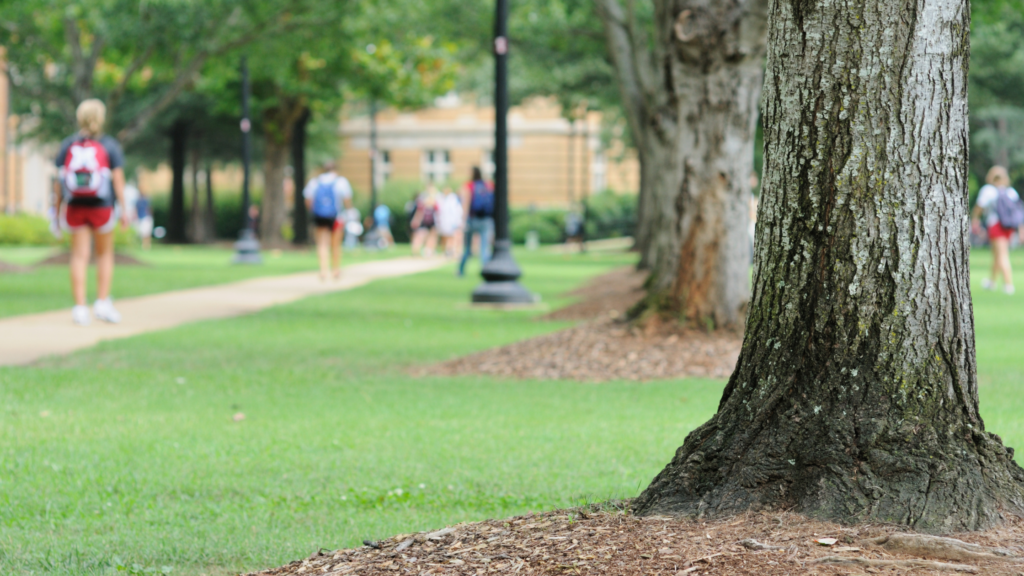
For prospective college athletes, choosing a college can be similar to buying a car… you first begin with a list of options, do research to narrow down the list, and visit in person to find the best fit.
For student-athletes looking to play college sports at an NCAA school, completing virtual campus tours and visiting campuses close to home can help narrow down the list of colleges before deciding on which campuses to put on your visit list.
The NCAA allows high school student-athletes to meet with the coaches and teams on campus, but there are limitations. In some cases, college coaches will pay for your transportation to the campus, as well as accommodations for an overnight stay (known as an official recruiting visit), while other times your family pays (unofficial visit).
The timing of allowable unofficial and official visits varies based on the sport played, your year in high school, whether the school is NCAA Division I (DI) or Division II (DII), and the specific time period for your sport’s recruiting calendar. The recruiting calendar generally allows unofficial visits to occur earlier than official visits.
Failure to follow the rules could result in a violation of the coach (and you!) receiving penalties, and it is important for recruits to familiarize themselves with the NCAA’s sport and division-specific recruiting calendars .
Whether you are a high school female basketball player (who is eligible to take an unofficial visit the moment you enter the 9th grade) or a high school male baseball player (who must wait until September of your junior year to visit a college campus) — you want to be ready.
Let’s plan ahead and get you ready for your visit long before you pack your bags and jump in the car. Buckle up!
The first thing we need to do is set expectations. Most college programs have small recruiting budgets and may not be able to pay for official visits, cutting-edge athletic facilities, or expensive recruit photo shoots. You must look past the superficial expectations and consider the most important factors when choosing a college: academic fit, campus fit, and athletic fit .
What is the Difference Between Official and Unofficial Visits?
What is an official visit.
Any visit to a college campus by a college-bound student-athlete or their parents that is paid for by the school. Before taking an official visit, a recruit must provide the college with their high school transcript and complete registration for a Certification Account with the NCAA Eligibility Center .
Beginning July 1st, 2023, student-athletes looking to compete at an NCAA Division I school are now allowed to take an unlimited number of official visits to NCAA institutions. It’s important to note that each school allows only one official visit per student-athlete, unless there’s a change in head coach after their first visit, allowing them to go on a second official visit. However, in the case of men’s basketball, a second visit is only permissible if it falls in a different academic year.
Additionally, all prospective DI and DII recruits must be placed on each school’s Institutional Request List (IRL) in order to take their official campus visit, receive an athletic scholarship, or sign a National Letter of Intent (NLI) .
What is an Unofficial Visit?
College campus visit paid for by student-athletes or their parents is considered an unofficial visit and an unlimited number of unofficial visits are allowed regardless of division level or sport.
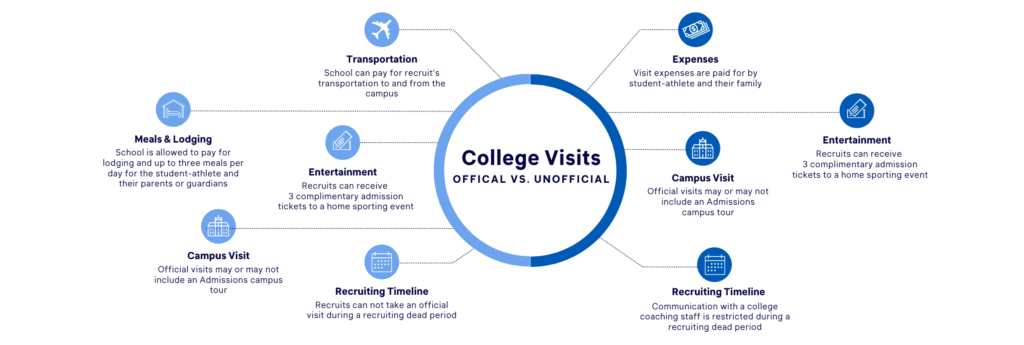
Let’s dive deeper into the visit details…
Unofficial visits can be initiated by a prospective student-athlete, as well as the college coaching staff who can suggest dates and times to visit the campus – taking into account the NCAA rules regarding quiet and dead periods . Taking an unofficial visit is best when a college coach is able to meet with you on campus and high school student-athletes are allowed to take as many unofficial visits as they wish.
Official visits are typically more structured and coaches may have a list of dates reserved for official recruit visits. Scheduling and expenses (including travel, meals, and lodging) for official visits are always arranged by the college coaches. During your visit, you will either stay with your family at a hotel or in a dorm with a student-athlete host while your family stays in a hotel.
Official visits may not last longer than a two-night stay.
Honest Insight : If allowed, choose visit dates that overlap weekdays with weekends. Weekday visits typically allow you to attend a class and give you the chance to see how student-athletes balance their weekday routine of class, practice, study hall, and strength workouts – while also allowing you to experience the campus on a weekend.
Regardless of the visit type you choose to take, it is important to plan ahead and give yourself (and the college coach) ample time to create the best college visit. Take into consideration that the team may be traveling during your (unofficial) visit, or the coach may only have a small window of time to meet with you. Having an organized plan for visits and communicating clearly will help in the recruiting process.
Now that you understand the difference between official and unofficial visits, let’s start planning your trip!
What to Know Before Your College Visit
As you narrow down the list of potential schools, you should research each school using free online resources, such as virtual campus tours and online tuition calculators. You don’t want to waste invaluable time during your visit seeking answers that you can find online. Make sure to research the following questions in advance of your visit:
- Research the athletic department – what conference do they compete in? Are their other sports programs successful?
- Research the team – do they compete nationally or regionally? Where are the players from? What are the team members majoring in? How long has the coach been there and do they have a contract with an expiration date?
- Research the school – have they cut sports recently? Are they adding sports?
Your campus visit should serve to strengthen your interest in the school and provide you with a sense of campus life. It will also give an insight into the team atmosphere and what it is like to be a student-athlete at that school.
Before your visit, you should think through the conversations you might have at the school to how to prepare for your visits and show your best self when talking with a school’s coaching staff.
You should also prioritize and plan out your visits by listening to each response from a coach during your pre-visit conversations. Do they have a recruiting timeline in mind? Are they hoping you will commit during your visit or shortly after? How many scholarships are available? Do they only have one scholarship, but are having multiple recruits visit the campus? All of these are things that you should pay attention to. Waiting too long to schedule a visit or delaying your final decision after you’ve visited the campus can result in missed opportunities.
Whether you’re traveling to campus during an unofficial or official visit, you should request an itinerary and ask if you’d like something to be added. If you want to do undergraduate research while in college, ask to see a lab. If you are curious about the surrounding community, ask for meal options off-campus. If you have specific physical, learning, or social/emotional needs, ask to meet with professionals on campus while you are there. These are all items that are difficult to schedule once you’re on campus, but if you request them ahead of time, a school should be able to accommodate your needs.
Some sports have recruiting cultures where students will verbally commit after an unofficial visit, long before they are able to schedule an official visit or sign a National Letter of Intent .
Honest Insight : Make sure you are 100% confident in your school choice! The more research you’ve done before your visit, the more prepared you’ll be to decide.
What to Pack for Your College Visit
With an itinerary in hand, you’ll be able to plan what you will need to pack for your recruiting visit. Comfortable walking shoes are key as you will likely be walking the campus for hours and you want to be comfortable. Are you joining the coaches at a nice restaurant? Pack restaurant-appropriate clothes. Are you meeting with the Athletic Director or Dean of Admissions? Make sure to pack business casual clothes for a professional impression. Will you be invited to train with the team? Add athletic training clothes and shoes to your bag.
What to Expect During Your College Visit
You’re on campus! Now is the time to open your eyes and ears to take it all in! Remember, you are recruiting the coaches and college just as much as they are recruiting you. Can you see yourself on campus? Are you ready for the climate? Is it close enough to home or a nearby airport or train station? While you are checking all of these things out, the Athletic Department and coaching staff will also be evaluating if you will provide value to their campus/program. Conduct yourself in a way that would make your family and high school coaches proud.
Your official visit should ALWAYS include one-on-one time with the coaching staff where the coaches should be honest about their commitment to you. Are you expected to make a decision by a certain date? Is an athletic scholarship offer on the table? Would a scholarship be a dollar amount or will it be a percentage of your total bill?
During your visit, make sure to speak about your academic needs and make sure you meet with an Academic Advisor to further understand the expectations for the student-athletes at the school.
Academic preparedness carries a lot of weight in the recruiting process – the academic advisor’s professional opinion of your academic ability could weigh heavily in a coach’s recruiting decision. Even if you only have a short time with the academic advisor, make it count! It’s important for the academic advisor to see how you answer questions and speak about your own academic needs and goals.
Honest Insight : The best recruiting visit, from an academic advisor’s perspective, is one in which the parent or coach allows the student and advisor to get to know each other. This time is crucial in two ways – first, the academic advisor must learn how to best support the student-athlete, and second, this is a crucial time for the student-athlete to learn about the academic expectations of that school. Is study hall mandatory? Do they check attendance at class and what are the repercussions for missing class? Will tutoring be required or is it optional, or even offered at all?
Be sure to have your Honest Game CARE® (College Athletic Report on Eligibility) or a high school transcript on hand during your visit. Having a plan will show that you are aware of what you will need to complete in your final semesters of high school and that you take your academic eligibility seriously .
While you’re busy picturing yourself as a student-athlete on the team, remember you will also be a member of the campus community one day. What would it be like if you couldn’t play sports? Eat in the cafeteria, stay in the dorms (or at least visit the dorms if the official visit has you staying in a hotel near campus), and look for events happening on campus to get a good understanding of campus life.
You also want to observe coach/player interactions.
If you are lucky enough to stay longer than a morning or afternoon, you’ll get a good sense of how the team interacts with each other, and how they feel about their coaching staff. These moments with the “host” athletes will help solidify your awareness of the culture and can often be one of the most important factors when deciding on schools. It is important to consider how the team interacts with each other, their coaches and with professors.
Wondering what you should ask current players during your visit? To get you started, here are a few sample questions to ask your host or players on the team:
- What does a typical day look like?
- How do you manage balancing classes with practice?
- How do professors react when you have to miss class due to traveling or games?
- Do the athletes do workouts together during the offseason?
- Are you close with other athletic teams? Are there opportunities to meet other athletes?
- Do you live with teammates, with athletes in other sports, or is it randomly selected?
- What is your favorite thing about the school?
- If you could do it all over again, would you choose this university?
- Any advice for me?
Coaches try to incorporate social activities into a recruiting visit, away from the athletic department and sports facilities, to give you a chance to get to know the team, and for them to get to know you. Remember, you only have one chance to make a first impression, and making good choices while on your recruiting visit is a wise decision. Follow the rules set forth by the NCAA and hold yourself accountable to team and campus rules. One bad choice on a recruiting visit could cost you your collegiate athletic opportunities – not only at the school but at other schools. Coaches and players talk, and news can travel quickly.
What to Do After Your College Visit
Once you leave campus and are able to sit back and reflect, make a pros and cons list while it’s fresh in your mind. Did you like the team? What if you couldn’t play sports anymore – would you want to stay at the school? Did the coaching staff talk about you using a redshirt year and how did that make you feel?
What you need to remember is a visit is just that, a visit. It’s a moment in time when you get to experience all that the team and school want to show you. However, that may not be the case every day for the next four years. Think about life on campus outside of the recruiting dinner with coaches – that won’t be an everyday occurrence once you’re a member of the team. Maybe you visited on a warm summer day but winter in the region is typically snowy and very cold. Think about life on campus the other 363 days of the year.
Choosing a college may be a family decision for you. Have open and honest conversations with those in your support circle to help you make your college decision. If you are used to your family being at every game, will you be upset if you are going to a college far from home? Do you have the financial ability to fly home or take the train during breaks if your sport allows, or will you remain on campus? Are others on the team in the same situation? Do they go to teammates’ homes for holidays?
Honest Insight: One of the most important steps you can take after your visit is to thank the coaching staff with an email or a handwritten note, as they took time out of their schedule and possibly money out of their budget to host your visit.
If you have decided to cross the school off your list of possibilities, make sure to tell the coaching staff as soon as possible. They most certainly have other recruits waiting on your decision and telling them your plans early is the right thing to do.
Once you have committed to a school, you should email and/or call the programs that have scheduled future visits letting them know you’ve made your decision.
Do not have your family or high school coach do this for you. These are hard conversations but it’s always best to be upfront and open about your plan. You never want to burn bridges on the recruiting trail… one day you may decide to transfer to one of the schools you previously visited.
Have more questions about the recruiting visit process? Honest Game Counselors are available to provide one-on-one assistance to support student-athletes in navigating post-secondary opportunities athletically and academically. Schedule a time to meet virtually with our experts .

Related Posts

Main navigation
- Admissions and Aid
- Life on Campus
- First-year Student Admissions
- College Checklist for Sophomores
Congratulations! You’ve made it through the first year of high school and you have an exciting future ahead of you. Your sophomore year is a good time to start thinking about where you want to go to college, and what you’ll need to do to get there. We’ve put together a list of actions you can take to start the process.
□ Get involved with extracurricular activities. Colleges look at your participation in extracurricular activities when you apply - like sports, school clubs or community projects - and they could help you obtain scholarships.
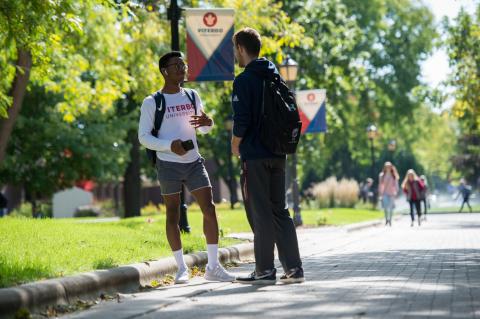
□Take classes that will help get you ready for college-level courses. Universities typically have credit requirements that they look for in subjects such as English, mathematics, social sciences, history and electives. Be sure to look into these so you can plan ahead. Also think about taking classes that will match up with what you want to study at college, as sometimes programs have their own set of entrance requirements. If you have questions, get in touch with us using the contact details below! We’d love to help.
□ Start to think about the kind of career you want. Work with your school counselor to determine what courses may make sense to take in high school to get you into the college course that will put you on that path.
□ Go to a college fair in your area. Your school counselor can help you find out about college fairs happening in your area. When you go, be prepared with the questions you want to get answers for about your college plans. Consider asking about what colleges are looking for in applicants, and about life on campus at their college.
□ Check out testing requirements at the schools you are considering. Many schools, like Viterbo, have adopted a test-optional policy. If you are considering schools that require testing, consider taking the PSAT or preACT. Check with your counselor about registration. These prep-exams are great practice for the real thing. Taking both of these tests might seem overwhelming, but by doing both, you may find you are more suited to one test over the other.
□ Think about what you'll do over the summer. Consider an internship, job or volunteer position, all of which can help you gain invaluable experience. These experiences can make your application to colleges stand out.
□ Get a head start on college visits. Think about what you’ll want to see on a college tour, and questions to ask. College visits are a great opportunity to talk to students about their experience on campus and to look at on-campus housing and classrooms to help you decide if a college is the right fit for you. To learn about visiting Viterbo, either virtually or in-person, click here.
Good luck on your sophomore year! We hope this checklist will help you as you think about your exciting future. If you have any questions about the admissions process, we’d be delighted to help. Reach us at 608-796-3010 or by email at [email protected].
Find Out More
- First-year Admissions Requirements
- Admitted Students
- First-year Cost and Aid
- Admissions Events
- Meet the Admissions Team
- Meet the Voyagers
- School Counselors
- Dual Credit for High School Students
- Four-year Graduation Guarantee
- Accepted Student Day
- TheDream.US Scholarship (Scholarship for DREAMers)
- Viterbo Tuition Promise
- Admissions Viewbook
- Schedule a Visit
- Financial Aid
- Parents and Families
What are your chances of acceptance?
Calculate for all schools, your chance of acceptance.
Your chancing factors
Extracurriculars.
Should You Visit College Campuses as a Freshman or Sophomore?

Want to know how your profile compares to students with similar goals?
See how your profile stacks up to other students and what areas you need to improve in order to meet your college and future career goals. Get started in minutes with your 100% free CollegeVine account!
I visited my first college, Amherst, the summer before my freshman year of high school. I had already tagged along on countless college trips with my older brother, who was at that point an entering college sophomore. Truth be told, I didn’t have the best attitude; it was my parents’ idea, and I felt like it was way too early to be visiting colleges.
Going on the trip early did have some benefits, though. Previously, I had wanted to attend a small, liberal arts school like Amherst, but after the tour, I realized that I preferred a more urban setting and a larger campus.
When’s the right time to start visiting colleges? There’s no easy answer to that question. Read on to find out some of the benefits and drawbacks of starting early.
Research takes time.
After visiting a campus, you’ll have time to research the school , if it sparks your interest. You’ll have time to thoroughly invest in and figure out what the school is really like. A first impression isn’t necessarily your final one, so having time to really investigate can help you decide if a particular college is the right place to spend your next four years.
You’ll have time to change your mind and decide what you really want.
The earlier you start visiting campuses, the more time you’ll have to really hone your interests and find a school with the right fit. Learn more about this process in Is It Too Early to Be Making My College List?.
You’ll learn about your own interests and what appeals to you in a college.
Like me, you may think that you prefer a small, liberal arts setting, but may discover early that you actually prefer an urban setting, or vice versa. Visiting a campus can tell you a lot about what you really want in a college, which will inform your college visit plan later. For instance, you may realize that you should be looking in big cities, as opposed to more rural or suburban areas.
You’ll learn how to do a campus tour right.
When you visit a school, there are many factors to consider: the community, what classes are like, the feel of the student body, and other considerations. (Learn more about what aspects to review in What Student Tours and Admissions Meetings Won’t Tell You About a College .)
Starting early allows you to hone your strategy and gives you time to reflect on and gauge a school’s fit. You’ll also learn how to properly debrief on a school after you visit it.
Your interests can—and probably will—change during high school.
You need to be flexible when making your college list. Your interests will evolve considerably over the course of high school, and you probably won’t finish as the same person you were when you started. As you change, so may the type of school you want to attend. So, a college that appeals to you now may not appeal to you later.
You may not understand yourself or your own interests well enough yet.
It’s easy to be caught up in the rankings of schools and other people’s interests . However, you’ll gain maturity over the next few years and better understand yourself as a result. This can influence you to, for instance, visit all the Ivies, rather than spend time looking at schools that might be better suited to your interests.
It can get expensive to visit colleges.
Since you may still be figuring out high school and may not have given too much thought into building your college list, you may not want to expend the resources until your college search is really underway.
There are other ways to gauge a campus’s fit without visiting, such as through online research, and talking to past students. We explore this more in How Can I Figure Out a School’s Culture Without Visiting the Campus? .
Visiting campuses, particularly ones that aren’t close to you, can get expensive, when you factor in travel, hotels, and meals out. You may want to put off the actual visits until you are absolutely sure that you’re interested in the schools.
You may not have had time to conduct research.
Research is an essential part of the college search. While researching the school after a visit is important, so is doing your homework before. You want to invest some time looking into a college before you visit, so you’re not wasting your time on a campus that might not be a good fit. Check out Kick off Your College Research This Summer with These 5 Tips for thoughts on how to properly research a school.
As an underclassman, you might not have had the time to fully research your schools—or even build a college list. That means you won’t get as much out of the visit as you might later on.
The Takeaway
There are certainly some things you can learn from visiting campuses early, but not everyone may be up for it. If you decide to visit schools as an underclassman, make sure you’re getting the most out of your visits: do your research, and take the time to really get to know the campus. It might be worth visiting again later in high school to solidify a school as a good choice for you.
For more tips on visiting schools and creating your college list, check out:
5 Tips for Building Your First College List
How to Start Your College Search
Tips for Choosing the Best Fit College
Curious about your chances of acceptance to your dream school? Our free chancing engine takes into account your GPA, test scores, extracurriculars, and other data to predict your odds of acceptance at over 500 colleges across the U.S. We’ll also let you know how you stack up against other applicants and how you can improve your profile. Sign up for your free CollegeVine account today to get started!
Related CollegeVine Blog Posts

Campus Visits: Know Before You Go
Find the right college for you..
You can only tell so much from colleges' websites and brochures. By spending time on campus, you can speak in person with an admissions officer as well as students and get a good idea of what academic and social life are like there. When it's time to choose a college to attend, you'll be better prepared to make an informed decision.
Arrange a Campus Visit
All colleges have admissions offices that can help you plan your visit. Your high school may organize group tours of nearby colleges. And you can plan your own informal visit to a college campus. Take these important steps first:
- Visit the college's admissions website to get details about arranging for an in-person visit.
- Check with your school counselor to see if any campus tours are scheduled.
- Set aside time to be on your own. Walk around the public area.
What to Expect When You Get on Campus
Campus visits can range from a quick hour to an overnight stay and from a casual guided tour to a formal presentation. Be sure to ask how long the whole visit will take so that you can be prepared.
Most campus visits will include the following:
- An information session, during which an admissions representative talks to you or your group about the college before the campus tour.
- A campus tour: These are usually led by college students. You'll see the main parts of the campus and have a chance to ask questions.
At many colleges, you can also arrange to:
- Attend a class.
- Meet with a professor.
- Meet with an admissions officer.
- Meet with a financial aid officer.
- Attend a club meeting or sports practice session.
- Eat in a dining hall.
- Spend the night in a dorm to experience student life.
Get Ready for Your Campus Tour
Before your visit, you need to prepare. It's a good idea to do these things:
- Explore the college's official website, and review any materials the college has sent you. This will help you come up with questions specific to that college.
- Make a list of questions to ask both staff and students. You can use our Campus Visit Checklist as a starting point.
- Explore the map of the college campus and make a note of where the admissions office is so you’ll know where you’re going. This will help ensure that you're on time for your visit.
When you're ready to go, remember to:
- Take notes in your phone or notebook so that you don’t forget the details of your collegiate trips.
- Take pictures so that you can remember what the campus looks like.
- Compare the colleges that you visit by using the Campus Visit Score Card .
What to Do if You Can't Make an In-Person Campus Visit
All is not lost if you can't visit in person. You can still:
- Check the admissions website to see if they have virtual campus tours or events.
- Talk to students who currently attend the college.
- Go online to see if the college has a newspaper you can read.
- View Campus Reel videos on BigFuture.
What should I take on a college campus tour?
When you visit any college, it's a good idea to take your smartphone or camera, notebook, and a small backpack. You'll want to make a record of your experience with pictures, videos, and notes. You may want a jacket or packable umbrella in your backpack to prepare for weather changes. Also, comfortable shoes are a good idea to avoid aching feet from taking the college tour.
What are 6 things you should do on a college visit?
One of the most useful things you can do on collegiate trips is to ask questions of current students. You'll likely get honest answers that will give you valuable insight into the school and its opportunities. Other things to do on a campus tour include:
- Visit the library.
- Visit classrooms.
- Ask an admissions officer questions.
- Take photos of at least three specific things you want to remember about the campus.
- Have a meal in the dining hall.
How do you prepare for college tours?
Before you visit any college, it's best to make a checklist of what you'd like to see. Try to include things on your list that you may not see on the typical college tour. Another thing to do is make a reservation to participate in a campus tour so that you can work it into your schedule for the day in advance. Put your items in your backpack the night before your visit so you have everything you need in one place.
What are good questions to ask on a college tour?
The best college tour questions tend to be about campus life. A few examples of good questions include: What is the typical class size? Do all first-year students live on campus? What are some examples of extracurricular activities? Do all students have access to an academic adviser? Where do students go to relax outside of class?
Are college tours worth it?
Yes, it's worth your time to take collegiate trips. Looking at a college's website and reading pamphlets can only provide you with limited information. When you visit a college, you get to absorb the atmosphere on campus and hear firsthand impressions from the students themselves. Plus, when you tour a campus, it allows you to imagine yourself as a student there. An in-person campus tour and your research at home should combine to give you a clear impression of the college.
Related Articles
Related topics.
- SI SWIMSUIT
- SI SPORTSBOOK
- FOOTBALL RECRUITING
2027 RB Camden Morton Recaps Georgia Tech Game Day Visit
Najeh wilkins | sep 5, 2024.
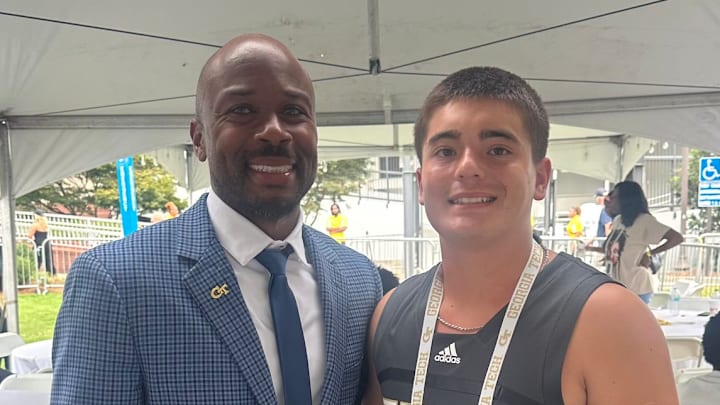
University Christian RB Camden K. Morton made his first visit to the Flats this past weekend when the Yellow Jackets took on the Panthers. Morton talked about some things that caught his eye while he was in Atlanta.
“This was my first time on campus and first game day visit with GT. My biggest takeaway was that the coaches really care about the future of the program,” said Morton. “My family and I sat down and Coach McKenzie and Coach Salem came over and really made us feel comfortable/wanted and that definitely motivated me as an athlete. Also, that the university and community are really behind/supporting the football program.”
Camden Morton also was in awe of the atmosphere on Saturday night against Georgia State which a lot of recruits raved about. Morton described it as a true college atmosphere.
“It definitely felt like a true college atmosphere. We got there super early around 2 pm and there were already game day vibes everywhere we went. Exactly what I was hoping for in terms of the atmosphere on a game day. Like I said, you could definitely feel that the entire community and university supports their football program,” said Morton.
Another thing Morton liked was the relationships he is starting to build with the coaching staff at Georgia Tech and how comfortable he felt while on campus.
“Coach McKenzie and Coach Salem you could really tell they care about GT’s future. They came straight over and really made us feel comfortable and wanted. Usually, game days feel rushed when it comes to talking with coaches which I get but at GT they spend a lot more time with you than other places. Speaking with the coaches is something really important to me as an athlete,” said Morton.
“I’d say the overall vibe of the program and the coaching staff. GT is a great school and it definitely feels like a great atmosphere there on campus. The location is also right in the heart of ATL.”
Morton came up this week to Atlanta to face Hebron Christian. Unfortunately, his team lost to one of the better private school programs here in the peach state 24-12. The recruiting phase for Morton is still fairly early as he is only a sophomore and still has two more years of varsity football before he makes an official decision. He likes the Yellow Jackets and the coaching staff. As recruiting continues to build he wanted to give a shout to his coaches at his high school University Christian for helping him navigate this process.
“I want to give a shout-out to my recruiter Joe Mento. He has a solid relationship with Coach Salem, he legitimately knows everyone. Also my teammates and my coaches at UCS. Coach Penland (HC) Coach Hammett (OC) and Coach Moore (RB Coach) together they have all helped put me in this situation and I’m blessed to have them all in my corner,” said Morton.

NAJEH WILKINS
Najeh Wilkins covers football and basketball for Georgia Tech Athletics at FanNation. He has experience in recruiting, hosting, play-by-play, and color commentary.
Follow najehwilk
Hope College

Football 9/6/2024 11:25:00 AM Alan Babbitt
2024 Football Season Preview
2024 schedule, coaching staff, 2024 roster, players mentioned.

#29 Luke Mandsager

#14 Ty Rynbrandt

#83 Oatis Ackermann

#30 Caden Balkon

#68 Connor Bovia

#70 Dylan Clem

#4 Sam Cochran

#98 Peter Costa

#0 Liam Danitz

#45 Andrew Debri

Thanks for visiting !
The use of software that blocks ads hinders our ability to serve you the content you came here to enjoy.
We ask that you consider turning off your ad blocker so we can deliver you the best experience possible while you are here.
Thank you for your support!
was not found

IMAGES
VIDEO
COMMENTS
Start planning early. As students get closer to the final year of high school, their schedules are filled trying to balance school and a social life - all while exploring potential college ...
Surprise! It's not! But don't take our word for it. Minnesota sophomore Claire Ficek can tell you all about the benefit of visiting college campuses early. Even before Claire decided to spend her sophomore spring break touring college campuses with her family, we knew she was smart.
Specifically, there are a myriad of benefits for students who begin their college campus visits during their sophomore year. Starting early can provide clarity, reduce stress, and offer a competitive edge in the college admission process. 1. Exploratory Phase and Self-Discovery. Sophomore year is often a time of self-discovery and personal growth.
Learn how to prepare for official visits to college lacrosse programs and what to expect from coaches and schools. Find out the NCAA rules, tips and FAQs for official visits in Division I, II and III.
College visits for sophomores are a great way to expose them to types of schools (urban, rural, large research universities, small liberal arts, etc.) This is a low-stress time to let your student ...
Learn how to schedule college visits throughout the year, during summer, or during breaks, and what to do and ask during your visits. Find out how to get the most out of your campus experience and show demonstrated interest in your top schools.
Here are 10Tips for Sophomores to Make the Most of College Visits: Put down the phone and look around. This visit is for YOU and you won't get much out of it if you're answering texts and checking Instagram. Pay attention - you're about to choose where you're going to spend the next four years of your life. Relax.
The goal of sophomore year is to set yourself up for success! Sophomore August/September: At the beginning of sophomore year, the most essential thing to focus on is your grades. Take the time now to set those high grades that will be your foundation for the rest of the school year. Focus on the extracurriculars that you like the most.
Your Sophomore year is an ideal time to carve out your academic identity with real-world experience. Look for opportunities to deepen your skills and expand your worldview. Making the most of your Sophomore year is a fantastic way to prepare for your academic future and prepare for the college application process while making the last two years ...
Learn how to prepare for college in 10th grade with tips on courses, grades, extracurriculars, languages, tests, and more. Find out what colleges expect from sophomore year students and how to stand out in the application process.
Learn why visiting colleges in the fall of your freshman or sophomore year is better than in the summer. Find out the best time of week, season, and tips for a successful college visit.
Explore virtual visit options to experience campus, connect with students and staff, and get your questions answered. Follow colleges on Instagram, Reddit, and Snapchat and you'll always know what's happening on campus. Check out YouTube videos to get a feel for campus life and get some great tips about applying, enrolling, and paying for ...
Learn how to plan your college visits as a junior, from brainstorming your preferences to asking the right questions. Find out how to get a personal campus visit, what to do during and after visits, and how to cope with COVID-19 restrictions.
Here are 32 example questions, collected from college admissions and enrollment professions, that students don't always think to ask on college visits. These questions - edited for length or ...
What are the benefits of making preliminary college visits during freshman or sophomore years of high school? These are simply informal college visits that include a walk around campus, a visit to the school library, or a stroll through the campus bookstore. It's easy to fit a brief college tour into your family vacation or spring or winter ...
Learn the difference between official and unofficial visits, how to plan ahead, and what to expect when visiting college campuses. Find out how to communicate with coaches, research the team and school, and prepare for your visit.
May need extra help or time to organize the college search. Here are 10 Tips for Sophomores to Make the Most of College Visits: Put down the phone and look around. This visit is for YOU and you ...
This web page offers a comprehensive checklist of tasks for sophomores to prepare for college applications, such as maintaining grades, extracurriculars, and relationships, and researching financial aid and summer activities. It does not answer the query about how many credits most sophomores end with in college.
College visits are a great opportunity to talk to students about their experience on campus and to look at on-campus housing and classrooms to help you decide if a college is the right fit for you. To learn about visiting Viterbo, either virtually or in-person, click here. Good luck on your sophomore year!
When you visit a school, there are many factors to consider: the community, what classes are like, the feel of the student body, and other considerations. (Learn more about what aspects to review in What Student Tours and Admissions Meetings Won't Tell You About a College.) Starting early allows you to hone your strategy and gives you time to ...
Learn how to find a good fit for your college by visiting the campus in person or virtually. Get answers to your questions, see the campus life, and decide if you feel comfortable and at home.
A guide for parents to help their 10th-grade child prepare for college and career. Find tips on summer activities, college visits, PSAT/NMSQT, financial aid, classes, extracurriculars and more.
Learn how to plan and prepare for a college campus visit, what to expect and do during the visit, and how to compare different colleges. Find out how to arrange a tour, attend a class, meet with students and staff, and more.
From the Missouri River to the Mississippi River and the 310 miles in between in Iowa, Saturday is a red-letter day for college football fans. Iowa State visits No. 21 Iowa for the next iteration of the CyHawk Series, one of the rare rivalry games played early each season. Hawkeyes coach Kirk Ferentz wishes more people knew about it.
Prospects from across the country took visits during Week One of the 2024 college football season, while others have upcoming trips planned. Here's the latest intel from several notable recruits ...
The main event of Week 2 in college football happens early Saturday. No. 3 Texas visits No. 10 and defending national champion Michigan in the day's only top-10 matchup. It's Fox's Big Noon Kickoff, and it comes 20 seasons after the Longhorns won their only previous meeting in a classic Rose Bowl. The Longhorns also were in the College Football Playoff last season and lost to Washington ...
Wilson and fellow sophomore CJ Allen are viewed as Georgia's up-and-coming inside linebackers, but it wasn't always a lock that Wilson was going to be a Bulldog. The Tallahassee native initially ...
Morton described it as a true college atmosphere. "It definitely felt like a true college atmosphere. We got there super early around 2 pm and there were already game day vibes everywhere we went.
The Flying Dutchmen kick off the season with three non-league games, beginning with Loras College (Iowa) on Saturday, Sept. 7, at 1 p.m. at Ray and Sue Smith Stadium. It's an Orange Out with fans encouraged to wear orange to support Hope. On Saturday, Sept. 14, at 1 p.m. the Flying Dutchmen host Franklin College (Indiana).
Isaiah Denis, official visit. A 6-5, 165-pound combo guard from Davidson (North Carolina) Day, Denis is the top prospect from his state, the No. 8 combo guard and overall No. 41 national prospect ...